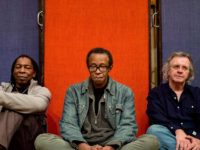When summarizing the best that jazz had to offer for this past year, I was tempted to write that it was a very good year for jazz, but then as far as I’m concerned, every year is a good year for jazz. For an art form that people have said for years is dying, there’s a lot of exciting, fresh records that come out every year and 2015 was no exception.
There were so many worthy new titles that the list of my picks for the best of the best is limited only to those where we’ve gave it the fully considered assessment and published a review on it. There are lots more that sounded good but didn’t get that formal appraisal. So many terrific new releases, so little time, ya’ know?
I came up with fourteen such releases that rose above the pack. Even the ‘pack’ has been rather good, and instead of a “honorable mention” list, perusing this archive of jazz reviews would do the trick. As for the winning picks listed below, click through on the titles to read the full reviews.
ALBUM OF THE YEAR
Mary Halvorson – Meltframe: Everything Halverson has brought forth lately has attracted widespread praise, and it’s well deserved. And yet, it always seemed Saturn Sings and Bending Bridges only hinted at what is the true essence of this one-of-kind guitarist and composer. It turns out, only Mary Halvorson can properly convey Mary Halvorson, because the solo guitar collection Meltframe feels like we’re getting the genuine, unadulterated version of her artistry. It’s an artistry that’s idiosyncratically and vividly ingenious, and often gorgeous. And when it’s acerbic and jolting, that only makes the pretty moments ever more poignant.
In choosing a program consisting of all covers, Halvorson is saying a great deal about herself more so than the composers she pays homage to. That is, she makes a point about the complexity of her own craft which doesn’t rely so much by abstracting these harmonies until they’re unrecognizable as you might expect anyone on the avant garde corner of jazz to do. Instead, it’s often by the jarring use of metal distortion and effects pedals juxtaposed alongside moments of soft, pure tone.
This is the Virtuoso of the New Millennium. More than her ensemble records ever did, Meltframe firmly establishes Mary Halvorson as the most original, creative guitarist of the last two or three decades.
.
BEST OF THE REST
Rudresh Mahanthappa – Bird Calls: One of the most forward-thinking saxophonists working today takes another step forward by casting his gaze back some seventy years to a prime influence, Charlie Parker.
Matthew Shipp Trio – To Duke: There’s a subversive current that rebels a bit against the elegance of these Duke Ellington strains, but the elegance always wins out. Still, the battles between these two sides cleverly set up by the Matthew Shipp Trio is where all of the allure and artistry of To Duke lie.
Syberen van Munster – Plunge For Distance: Right from this debut, van Munster is a fully formed composer, guitarist and bandleader with his own way of doing things by pulling together familiar elements into a new, intelligent signature language. Moreover, he didn’t have to be fast, loud or atonal to make his music uniquely interesting and captivating.
Ben Goldberg – Orphic Machine: A testament to the immortality of forward-thinking ideas that keep the soul of its originator alive after the body has passed. It’s also testament to Goldberg, who has sublimely assimilated so many disparate influences and is able to distill them into a product he projects through his own, kaleidoscopic lens.
Harvie S and Sheryl Bailey – Plucky Strum: A treat for anyone who likes the sound of expert finger picking guitar joined to one of the best stand-up basses in the business.
Kait Dunton – trioKAIT: Playing music with a breathless attitude and fresh, twitchy compositions that do much more than swing is almost anathema to jazz. Dunton makes it her signature sound, and she takes it further with a new, sympathetic rhythm section.
Michael Bisio – Accortet: It’s the interaction among the players using paths least taken that bring life to Bisio’s compositions, no matter how structured or loose those songs are. Like everything else Michael Bisio is involved with, empathy is a key element in making it all work.
Kari Ikonen Trio – Beauteous Tales and Offbeat Stories: With just the right amount of emotion and mystery, Ikonen leads his combo into another playful, reflective and inventive outing. The Kari Ikonen Trio is the emerging European piano trio that people should be paying a lot of attention to.
John Scofield – Past Present: A perfect companion to those early 90s albums Scofield made leading a bop quartet featuring sax giant Joe Lovano, and the years in-between quickly melt away as soon as the record starts playing.
Matthew Shipp Trio – The Conduct of Jazz: Shipp, Michael Bisio and new drummer Newman Taylor Baker are so naturally unconventional even when they make a conscious effort to stay within the established parameters of jazz. As a result, The Conduct of Jazz honors the real jazz tradition of breaking outside of previously placed constraints.
Scott DuBois – Winter Light: From the first awakening passages to the final winding down and all the impassioned moments in-between, Winter Light is always going for something beyond just songs and solos. With his composing pen, leadership and guitar, Scott DuBois has painted a Monet.
Robin Eubanks Mass Line Big Band – More Than Meets The Ear: This might be just what big band jazz needs to get revitalized. Robin Eubanks had invested a lot of himself as a musician to thrust the venerable jazz orchestra concept into the twenty-first century.
Antonio Sanchez – Three Times Three: Sanchez’s showcase album with three distinct fortified trios that leaves no doubts as to his vast abilities as leader, composer and — not least — elite drummer.
RESISSUE OF THE YEAR
Anthony Braxton – Trio and Duet: Braxton’s almost-forgotten 1974 release pays earnest fealty to the classic strains of an earlier era in sharp relief to his avant-garde bent. But to understand Anthony Braxton is to understand that there is no contradiction at all between these two features of him.
< S. Victor Aaron’s Best of 2015 (Non-Jazz) ||| S. Victor Aaron’s Best of 2015 (Experimental/Avant-garde) >
- Christian Marien Quartett – ‘How Long Is Now’ (2024) - April 18, 2024
- Dave Douglas, feat. James Brandon Lewis – ‘Gifts’ (2024) - April 11, 2024
- Thollem – ‘Worlds In A Life, Two’ (2024) - April 8, 2024




